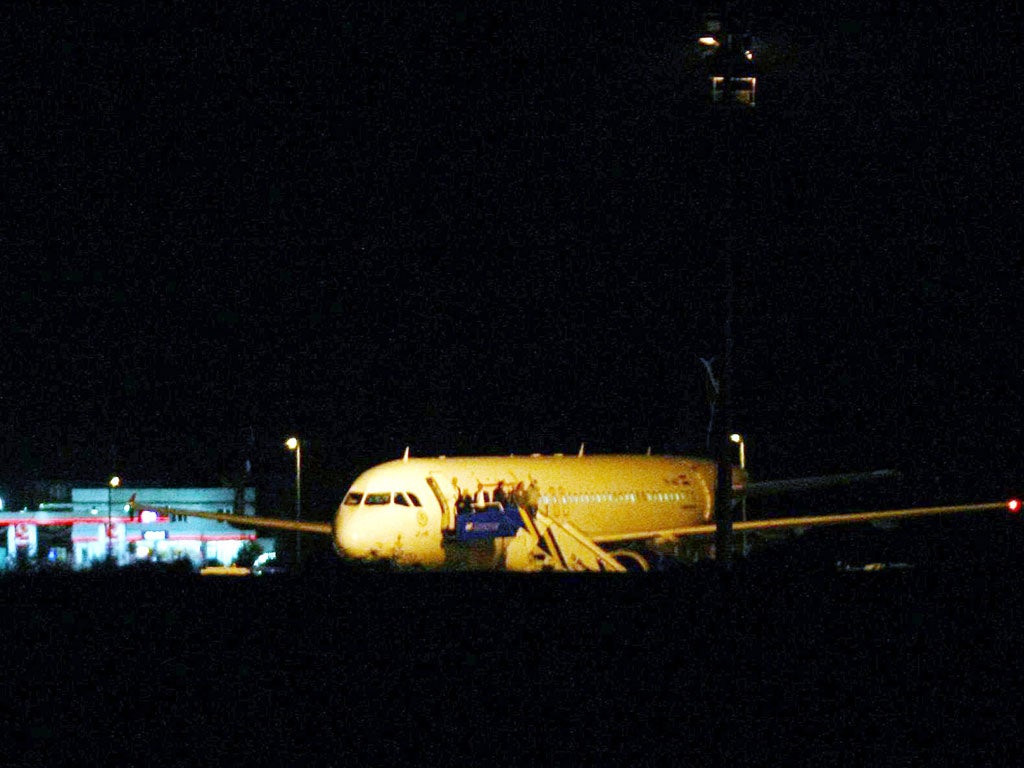Grounded in Ankara: The Russian 'munitions' flight that was heading for Syria
Moscow rejects Turkey's claims that jet contained military hardware

Turkey's Prime Minister insisted yesterday that a Syrian passenger plane forced to land at Ankara airport was carrying Russian-made munitions, putting him squarely at odds with Moscow which has angrily condemned Turkey's actions.
Russia demanded to know why embassy staff were prevented from talking to Russian passengers on board the Airbus A320. The plane was forced to land in Ankara by Turkish fighter jets on Wednesday night while en route from Moscow to Damascus, heightening international tensions over the bloody civil war to oust President Bashar al-Assad.
"This was munitions from the Russian equivalent of our Mechanical and Chemical Industry Corporation being sent to the Syrian Defence Ministry," Prime Minister Recep Tayyip Erdogan said, referring to a state-run Turkish manufacturer that supplies the country's army.
The items, according to differing accounts, were parts for a missile and communications equipment. Officials in Moscow, however, have refuted Turkish claims that any military equipment was found on board the plane, which was allowed to continue to Damascus after its cargo was confiscated. "Neither weapons nor any systems or assembly parts for military equipment were or could have been on board the passenger plane," a senior official in Moscow said. "If it had been necessary to ship any military hardware or weapons to Syria, this would have been done through the established procedure rather than in an illegal way."
The Kremlin has criticised Turkey's conduct, with foreign ministry spokesman Alexander Lukashevich saying: "We are concerned that this emergency situation had put at risk the lives and safety of passengers, who included 17 Russian citizens." Ankara's actions were, said the spokesman, "quite serious because without total certainty that there is something there, you are taking a great risk by ordering it to land".
He also warned of long-term damage to relations between the two countries. "Until recently, there was the impression that the serious differences over Syria would not influence Russian-Turkish ties. Now the situation has changed. This is linked to the fact that Turkey has become too deeply involved in Syrian domestic affairs," he said.
Turkey, while insisting that its actions were justified, warned that there may be retaliation. At the same time there remains the threat of increased artillery strikes in response to shelling across the border by Assad's forces.
The Syrian regime attacked "piracy" by the Turks over the interception of the airliner. "This hostile and deplorable Turkish act is an additional indication of the hostile policy of Erdogan's government, considering that it trains and harbours terrorists and helps them infiltrate into and bombard Syrian territory," the foreign ministry in Damascus said.
Iraqi officials have also criticised Turkey's role in the Syrian conflict. Speaking during a visit to Moscow prior to the incident on Wednesday, the Iraqi Prime Minister, Nouri al-Maliki, said: "Turkey is being presumptuous, you could say, as if it were taking responsibility for solving the Syrian conflict instead of the Syrian people, and wants to impose its own solution. For this reason the international community needs to stop Turkey from intervening."
Mr Maliki, whose government has been accused by the US of allowing the transit of Iranian arms to the Syrian regime, also stressed that the Erdogan government should not try to get Nato involved in the situation, saying this would make the problem worse.
Nato has held an emergency meeting at the request of Turkey, a member state. Secretary-General Anders Fogh Rasmussen said before a meeting of defence ministers in Brussels: "We have all necessary plans in place to protect and defend Turkey if necessary."
Western intervention in the Syrian conflict continues to be unlikely, but the violence has spread to neighbouring countries other than Turkey; there have been clashes in Lebanon; crossing points changing hands on the Iraqi frontier; cross border firing in Jordan; and shells coming into Israeli-occupied Golan Heights.
In addition, hundreds of thousands of refugees have fled to Turkey, Lebanon and Jordan, putting immense pressure on resources.
Violence continued inside Syria yesterday with clashes in Aleppo, suburbs of Damascus and Homs. The first female officer from the Alawite community, from which the ruling elite is drawn, defected yesterday. In a video posted on YouTube, Colonel Zubaidah al-Miqi said: "I declare my defection from the ranks of Assad's treacherous brigades ranks, being the first female defected officer from the Alawite sect, I'd like to direct this message.
"My people, my sect: the ongoing conflict in Syria now is a conflict between the oppressor and the oppressed and that means the conflict was never between religious sects and minorities but the regime is turning it to a sectarian conflict to contain the revolution and destroy it."
Timeline: Turkey-Syria tensions
9 April Shots fired from Syria over the border kill two people and wound dozens more at a refugee camp for Syrians in the Turkish province of Kilis, provoking strong protest from Ankara.
22 June Syrian air defences shoot down a Turkish fighter jet. Syria insists it did not know the jet belonged to its northern neighbour, but some Turkish politicians declared the incident was "an act of war". Officials in Damascus eventually apologise.
3 October Three mortar rounds fired from inside Syria land in the Turkish town of Akcakale killing five people, including two children, and sparking a cross-border exchange of fire. A day later, the Turkish parliament approves military operations inside Syria.
10 October Ankara orders Turkish military jets to intercept a Syrian plane en route from Moscow to Damascus after intelligence reports that weapons were on board.
Subscribe to Independent Premium to bookmark this article
Want to bookmark your favourite articles and stories to read or reference later? Start your Independent Premium subscription today.

Join our commenting forum
Join thought-provoking conversations, follow other Independent readers and see their replies